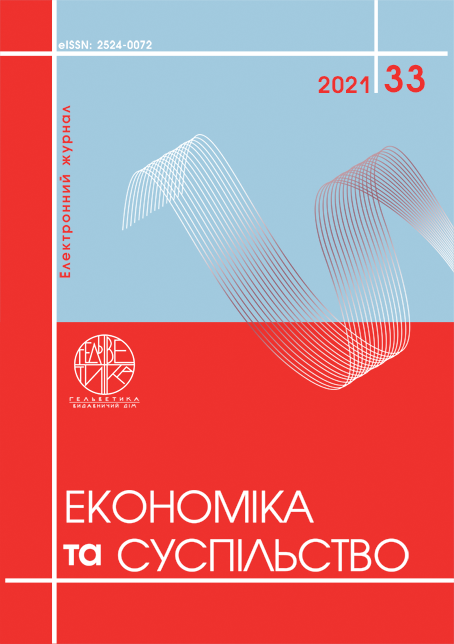THE DEVELOPMENT OF MANAGEMENT OF TALENTS IN THE SYSTEM OF PERSONNEL MANAGEMENT OF THE ENTERPRISE
Abstract
Management of talents and its development talents in the system of personnel management of the enterprise is investigated in the article. Foreign researchers show the change to the concept of “management human capitals” to strategic level of management personnel term “management talents” is widely used. Different determinations of the concept of “management talents” is analyzed, which confirms its focus on the strategic level of management personnel. The essence of the concept of “management talents” as the activity of HR-department (division) with forecasting of talented workers’ volumes, that may be need by the company, conditioning for their timely introduction, determination of professions and the level of competence before their potential recruiting is offered. The essence of the concept of “talented worker” is not researched enough the categories of personnel which belong to the enterprise of food industry is discussed. Essence of the concept of “talented worker” as a worker that has professional capabilities, skills, knowledge, experience and works with a high creativity and productivity, always tries to improve the job results is offered in the article. For every category of personnel can be the indexes for determination of talented worker: administrative, technological, technical, organizational, marketing decisions (achievements), achievements of economic, financial results, providing of the level of products competitiveness, invention, rationalizer, certification, tutorship and others like that. Every enterprise also can pull out its own requirements to the personnel with the aim of development of talented workers and providing their competitiveness. The methodical approach to the estimation of the level of management of talents on the basis of determination of integral index by five constituents: reputational, motivational, organizational, skilled and personnel development is offered. This approach will allow finding its weak and problem points with the aim of further improvement and removal of negative tendencies in the personnel development of the enterprise.
References
Майклз Э., Хэндфилд-Джонс Х., Экселрод Э. Война за таланты [Текст] : пер. с англ. Москва : Манн, Иванов и Фербер, 2005. 261 с.
Эффрон М., Орт М. Управление талантами: краткий курс. Москва : Азбука Бизнес, Азбука-Аттикус, 2014. 224 с.
Tomas Chamorro-Premuzic The Talent Delusion: Why Data, Not Intuition, Is Key to Unlocking Human Potential, Little Brown Book, London. 2017. 304 р.
Ragland Thomas What will be your strategy for 2018? URL: http://www.management.com.ua/notes/talent-strategy-2018.html
Робертсон Алан, Эбби Грэм Управление талантами : Как извлечь выгоду из таланта ваших подчиненных. Днепропетровск : Баланс-Клуб, 2004. 176 с.
Schweyer A. Talent Management Systems: Best Practices in Technology Solutions for Recruitment, Retention and Workforce Planning. Toronto, Ont.: Wiley, 2004. 253 p.
Watkins D. Lightyear – An Application Framework for Talent Management That Acts as a Central Feedback Center for all Organizational Functions. – Softscape, Inc. URL: https://www.scribd.com/document/255608672/Talent-Managment
Винничук Р. О. Таланти як особлива категорія працівників організації. Глобальні та національні проблеми економіки. 2018. Вип. 21. С. 246–250.
Кузнецова Н. Б. Концепція управління талантами в системі менеджменту знань. Соціальнотрудові відносини: теорія та практика : зб. наук. праць. Київ : Інститут соціальнотрудових відносин КНЕУ. 2014. № 2(8). С. 181–187.
Продіус О. І., Журавель А. І., Сітор М. О. Талант-менеджмент як невід’ємна складова успіху організації. Економіка: реалії часу. 2013. № 1 (6). С. 172–177. URL: http://economics.opu.ua/files/archive/2013/n1.html
Щьокіна Є. Ю., Задорожнюк Н. О., Білоусова І.А. Система управління талантами в сучасних організаціях Інфраструктура ринку. 2020. Вип. 43. С. 347–351. URL: http://nbuv.gov.ua/UJRN/ifrctr_2020_43_65.
Лук’янихін В. Менеджмент персоналу : навчальний посібник. Київ : Університетська книга, 2015. 592 с.
Michaels E., Handfield-Jones H., Excelrod E. (2012) War for Talent / transl. from English. Yu.E. Kornilovich. Moscow: Mann, Ivanov and Ferber, 280 p.
Effron M., Orth M. (2014) Talent management: a short course. Moscow: Azbuka Business, Azbuka-Atticus, 224 p.
Tomas Chamorro-Premuzic The Talent Delusion: Why Data, Not Intuition, Is Key to Unlocking Human Potential, Little Brown Book, London. 2017. 304 р.
Ragland Thomas What will be your strategy for 2018? Source: http://www.management.com.ua/notes/talent-strategy-2018.html
Robertson Alan, Abby Graham Talent Management: How to Benefit from the Talent of Your Subordinates. Dnepropetrovsk: Balance Club, 2004. 176 p.
Schweyer A. Talent Management Systems: Best Practices in Technology Solutions for Recruitment, Retention and Workforce Planning. Toronto, Ont.: Wiley, 2004. 253 p.
Watkins D. Lightyear – An Application Framework for Talent Management That Acts as a Central Feedback Center for all Organizational Functions. Softscape, Inc. URL: https://www.scribd.com/document/255608672/Talent-Managment
Vynnychuk R. O. (2018) Talanty yak Soboleva katehoriya pratsivnykiv orhanizatsiyi. [Talents as a special category of employees of the organization] Hlobalʹni ta natsionalʹni problemy ekonomiky. № 21. S. 246–250.
Kuznetsova N. B. (2014) Kontseptsiya upravlinnya talantamy v systemi menedzhmentu znanʹ. [The concept of talent management in the knowledge management system]. Sotsialʹno-trudovi vidnosyny: teoriya ta praktyka : zb. nauk. pratsʹ. Kyiv : Instytut sotsialʹno-trudovykh vidnosyn KNEU. № 2(8). S. 181-187.
Prodius O. I., Zhuravelʹ A. I., Sitor M. O. (2013) Talant-menedzhment yak nevidʺyemna skladova uspikhu orhanizatsiyi. [Talent management as an integral part of the success of the organization]. Ekonomika: realiyi chasu. № 1 (6). S. 172–177. URL: http://economics.opu.ua/files/archive/2013/n1.html
Shchʹokina YE. YU., Zadorozhnyuk N. O., Bilousova I. A. (2020) Systema upravlinnya talantamy v suchasnykh orhanizatsiyakh. [Talent management system in modern organizations]. Infrastruktura rynku. № 43. S. 347–351. URL: http://nbuv.gov.ua/UJRN/ifrctr_2020_43_65.
Luk'yanykhin V. (2015) Menedzhment personalu: navchalʹnyy posibnyk. Kyiv: Universytetsʹka knyha. 592 s.


